13 benefits of running for women - and why it's particularly great if you're over 50
There are so many benefits of running, from improving your fitness to lowering your stress levels. Here, the specialists reveal everything women have to gain from the sport
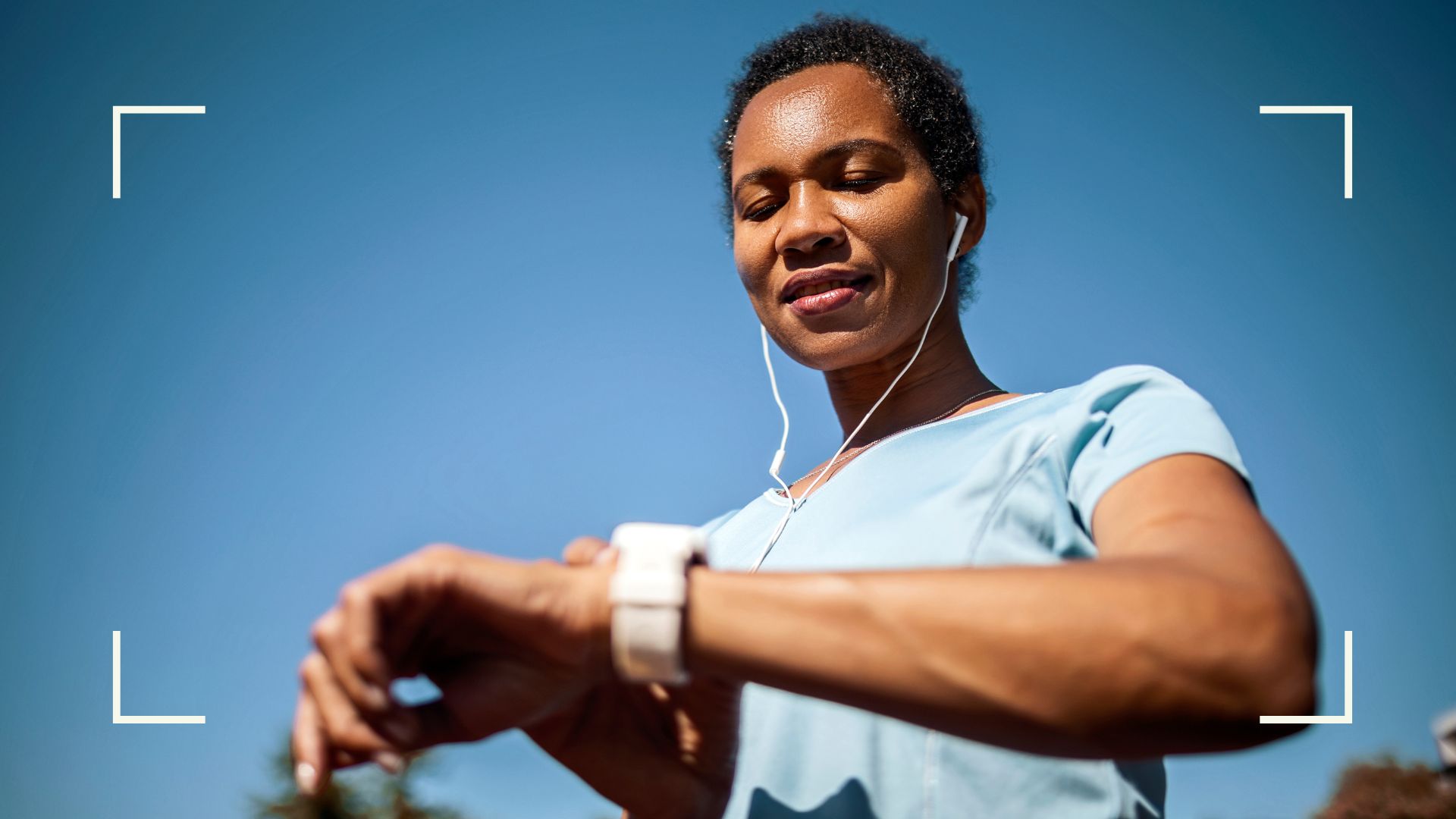

As one of the most popular sports out there, it comes as no surprise that there are many benefits of running for women. But improved bone density, better cardiovascular fitness, and improved lung health are just the beginning, with experts revealing the lesser-known running benefits out there.
Not everyone likes running, and that's totally fine. Many of these excellent benefits are equally available to those who prefer cycling, hiking, walking, or strength training - it's all about choosing the movement you enjoy. However, if you are looking to try something new or already know you love running but aren't sure if it's the best sport for your health right now, we've got you covered. Running does come with some impressive advantages, especially concerning our mental health, thanks to that so-called 'runners high'.
So, what are the benefits of running for women? Here, woman&home speaks to several certified health specialists, from doctors to endurance coaches, menopause specialists and more, to reveal them all. All you need to do is find your pick of the best running shoes, start stretching, and get out there.
Benefits of running for women
1. Improves bone density
Perhaps one of the top benefits of running for women is how it can increase bone density, says Dr Sharon Gam, a personal trainer and health coach with a Ph.D. in exercise physiology. "Each time your muscles pull on your bones and each time force goes through your leg as your foot hits the ground, your body senses that strain and starts sending cells to reinforce your bones and make them thicker and stronger," she explains.
This is particularly important for women approaching or experiencing menopause symptoms. "We tend to lose muscle mass and bone density from a combination of hormonal changes during this time. In particular, the hormone estrogen is important because it slows down the natural breakdown of bone. During menopause, when estrogen levels drop, bone loss can increase quickly. This is a major reason why women are at high risk of osteoporosis and fractures."
This being said, overtraining or undereating while training can switch this big positive to a negative, Gam warns. "It's important to be sensible with the amount and distance of running you do, get enough rest and recovery, and make sure you're fueling and nourishing your body with good quality food. Some studies [including those by Dong-A University College of Medicine] have found that some women who run very long distances, such as marathons or longer, have lower bone density."
2. Increases cardiovascular fitness
While running isn't the only sport to offer an increase in cardiovascular fitness - consider weighing up walking vs running if this is your main goal - it's certainly one of the main benefits of the sport.
Sign up for the woman&home newsletter
Sign up to our free daily email for the latest royal and entertainment news, interesting opinion, expert advice on styling and beauty trends, and no-nonsense guides to the health and wellness questions you want answered.
"Running offers an intense cardiorespiratory stimulus because it's a full weight-bearing activity and cardiorespiratory fitness refers to the capacity of the vascular and respiratory system to get oxygen to the body," explains Marco Anzures, a USA track and field certified endurance coach. "Running causes an increase in cardiac output (CO) which is facilitated by an increase in heart rate and stroke volume, or the amount of blood the heart pumps per beat. Over time, this type of stress makes your heart stronger and increases the amount of oxygen that can be delivered to your muscles."
The individual benefits of this are numerous, he notes, as it "promotes healthy ageing in many ways and it's associated with a reduction in risk for developing a host of chronic diseases, such as hypertension, stroke, and diabetes." There's even research by the American Heart Association that suggests running can cut women's risk of cardiovascular disease by as much as 45%.
3. Eases menopause symptoms
There are several reasons why running will help ease some of the more difficult symptoms of menopause. "Over ten years ago, research was showing that running lessened the symptoms of menopause," says Kristen Hislop, a certified running and triathlon coach with over 40 years of experience in the industry, pointing to research by Rush University Medical Center among others. "That's because perimenopause is estrogen decreasing in the body and running slows that down." In turn, a further study by the Medical University of Silesia suggests this lessens incidents of hot flashes and slows the rate of bone and muscle loss.
"Night sweats and sleepless nights are two other common symptoms," she says, and running can help with this. "It's a naturally difficult exercise. Fatigue the body and it will ask for recovery, helping you to sleep better."
This is certainly something many women find, including writer Samantha Priestley, who recently wrote about her experience running 30 minutes a day to help combat her menopause symptoms.
However, Hislop warns that as much as running can really help those going through menopause lessen their symptoms, it won't be a cure-all. "You'll have those days where you just can't run, don't want to, and that's OK. Maybe a walk would be better or some barefoot gardening. Be kind to yourself and embrace the activity of the body and the mind."
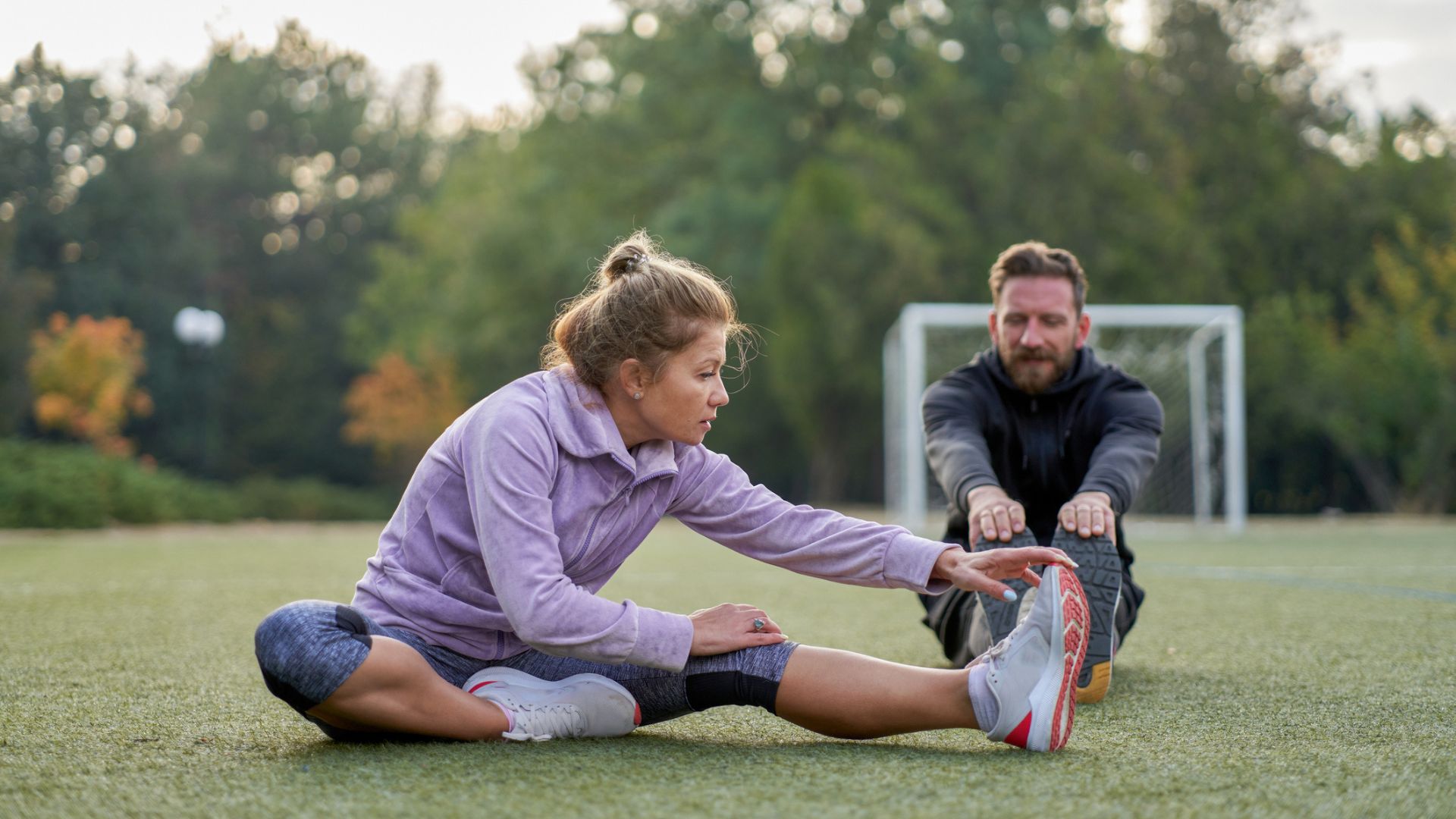
4. Aids weight loss
Often referred to as menopausal weight gain, gaining weight during menopause is perfectly natural thanks to a combination of hormonal changes, a loss of muscle mass, less sleep, and increased insulin resistance. If this is something you'd like to change, Hislop says running can be hugely beneficial.
"I hate talking about calories, but running does burn the most," the coach says, with studies associated with the University of Calgary highlighting the benefits of running for women who want to lose weight during menopause. The study looked at 400 inactive women and found that 300 minutes a week (or at least 150 minutes) was most beneficial for those who were trying to lose body fat. However, running for weight loss routines can also be beneficial for those looking to make some changes out of menopause.
5. Running helps women sleep better
For women of all ages, but especially those over 50, exercise and sleep have a very strong link. "Specific to menopause, studies like that from Beijing Normal University have found that structured exercise can improve sleep quality and decrease insomnia symptoms," explains Gam. "Exercise helps train the nervous system to switch between activated and restful states. Since many people spend most of their day in a stressed state that keeps their sympathetic nervous system [the 'fight or flight system'] active, it can be difficult to switch to parasympathetic nervous system activation, which is the 'rest and digest system' that helps regulate sleep. Exercise makes both parts of your nervous system work better, so it’s easier for you to shift into sleep."
A wide review from the David Geffen School of Medicine at the University of California went even further, and although more general with its participant group, the research found that out of 34 studies on the link between sleep and exercise, 29 concluded that exercise had a significant and positive effect on sleep.
"Exercise also reduces symptoms of anxiety and depression and since both of these conditions are associated with sleep problems, exercise can help break the poor sleep cycle that they cause," adds Gam.
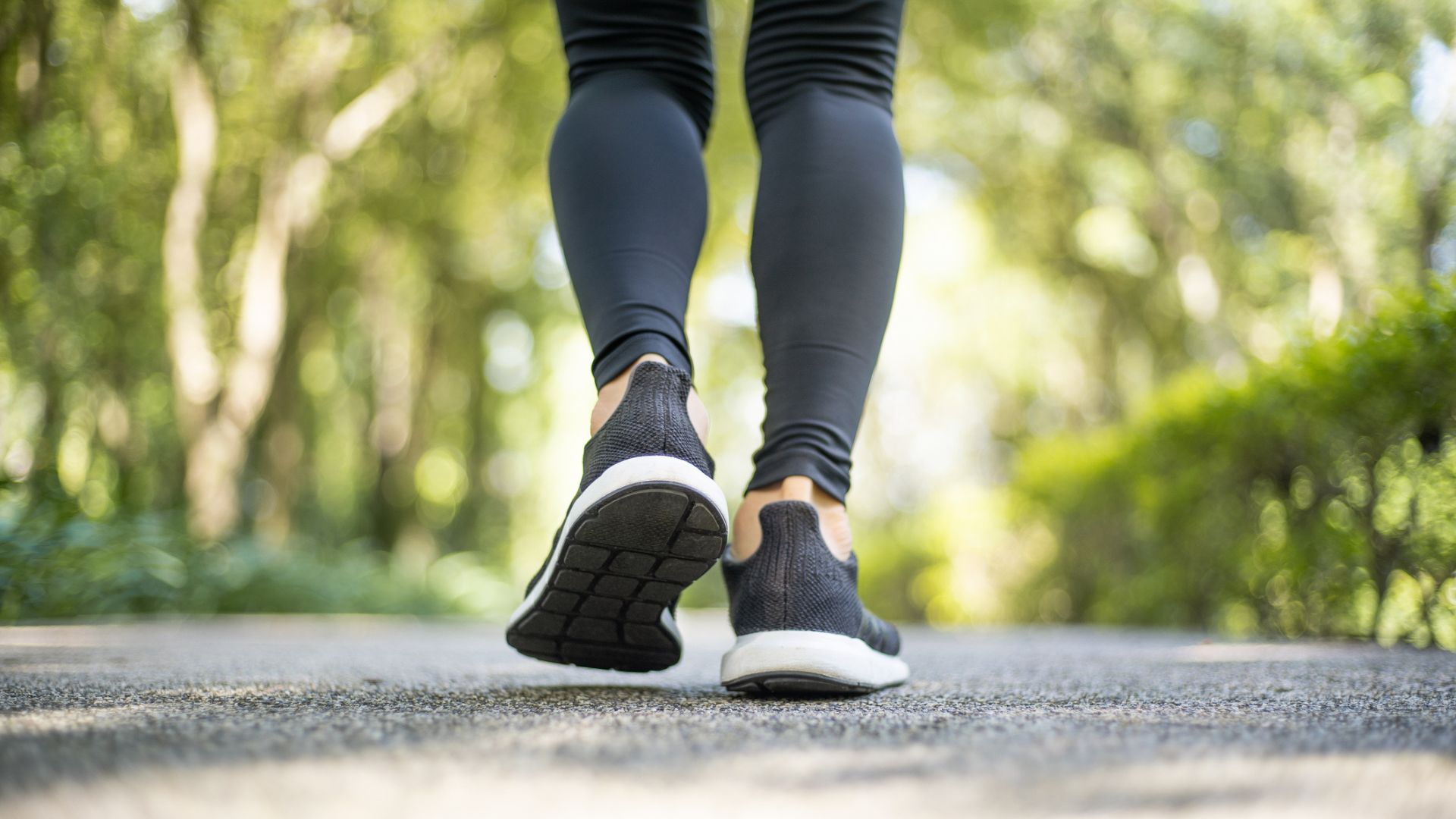
6. May help reduce your cancer risk
Running, power walking, or jogging - however you want to move - has been shown in several studies over the years to greatly reduce our cancer risk. This is down to some of the many other running benefits for women, such as better cardiovascular, lung, and brain health.
Of course, there's no way to say for certain, considering that cancer can be caused by any number of factors, but the review of 170 studies recorded by the Alberta Cancer Board suggests that moving more may decrease our risk, with further research by the National Cancer Institute suggesting that physical activity of any kind can help reduce the risk of bladder, breast, endometrial, gastric, and colon cancers.
7. Increases resilience
There's nothing like a Couch to 5k training plan or an hour spent running a couple of times a week to grow our resilience. If you can push through your mental wall and run to the finish line, whether that's a race or your front door, you can do anything.
At least, that's what research from the University of Iowa suggests. The study, which examined 57 older adults, found that because the cardio activity requires consistent effort over a longer duration of time, doing it often can help improve our ability to stick with a task for longer - even when it's difficult.
8. Running can help build confidence
Running is famously one of the best ways to build confidence. Much like how running builds resilience, it's impossible not to feel more confident after you're done. You know that you've achieved something you weren't able to not too long ago - or you've done something you've never done before. That, combined with the confidence affirmations that naturally run around in our heads when we're forced to push ourselves, is surely one of the biggest running benefits for women.
9. Lowers stress
Stress, habitual burnout, and emotional fatigue are all more common in women, research by Umea University reveals. But running, the experts agree, can help to combat this.
"The exact mechanisms by which exercise and running reduce stress are still unknown but one theory suggests that the stress response from exercise confers benefits to your body's ability to handle all kinds of stress, be it emotional, social, or mental," says Anzures, pointing to leading research by the University of Liverpool.
Another theory is the feeling of 'runner's high', which tends to feel like a flood of happy hormones that lasts for hours after a run. "Running doesn’t take a lot of time or equipment but there are so many benefits. You may not find it zen the first time out but the more you go the more you’ll find those endorphins kick in. Some people just feel happier, some solve problems, and some take time to breathe deeply and enjoy their surroundings," says coach Hislop, who also directs the Freihofer's Run for Women, one of the largest all-female 5kms in the US.
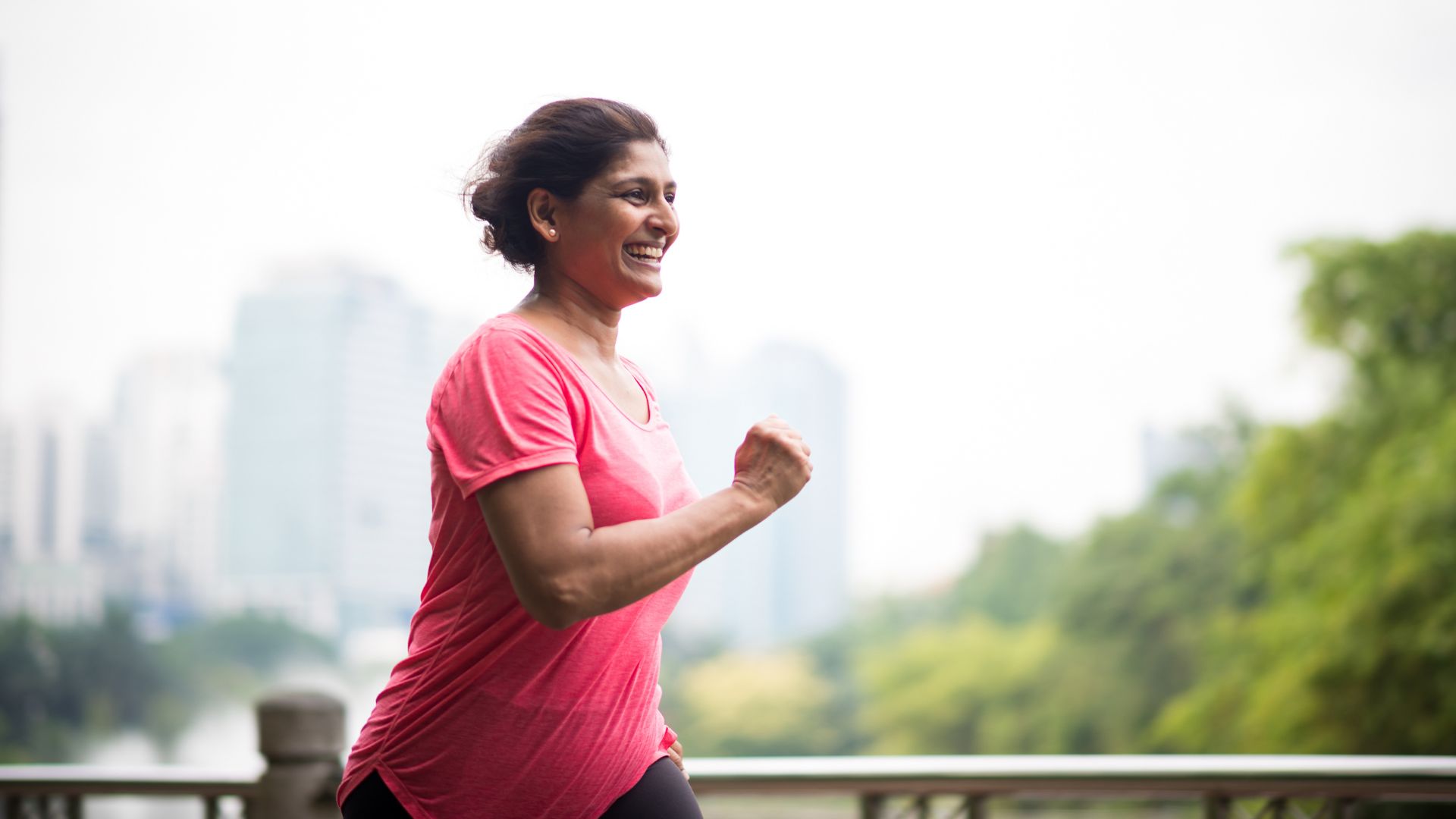
10. Better time management
Looking to learn how to organize your life in 2023? Running could be the answer. Not only does it help women manage stress, and increase our energy levels, confidence, and resilience, but sticking to a training schedule makes us more disciplined. Early mornings, training sessions after work, and fitting in a jog around seeing family, friends, and everything else in life are bound to make you more organised. This can then be transferred to all other areas of life.
Plus, there's evidence from the National Polytechnic Institute in Mexico that shows running contributes to improved memory consolidation and learning, helping us to remember important dates and pick new things up quicker.
11. Improve performance in another sport
If you're weighing up the benefits of cycling vs running, for example, because you prefer life on the bike but you're wondering if running is 'better', we've got some good news. Firstly, any sport that raises your heart rate will have similar benefits to running, and secondly, running can really help improve your performance in other sports, so why not just do a bit of both?
"Running provides a host of benefits that can complement other sports, especially for those just starting their exercise journey," says Paul Kinney, a multi-sport endurance coach with over 22 years in the industry. The four biggest benefits that runners can transfer into another sport are:
- A better-functioning cardiovascular system: "Running will improve the function of the cardiovascular system. Over time, this allows the heart to pump oxygenated blood to the working muscles." This makes exercise easier to do, no matter the sport.
- Better lung function: "Lung function also improves in transporting oxygen into the bloodstream and removing carbon dioxide. The result that the dedicated runner sees is a lower heart rate for a given effort." As expected, those will better lung function will find it easier to maintain their breathing rate while working out.
- Lower heart rate: "Running HR also drops as the heart doesn't have to work as hard to supply the body with the necessary nutrients to support normal bodily functions," Kinney, who also founded Revolution Endurance, explains.
- Improved fat metabolism: As well as its benefits for weight loss, a higher fat metabolism helps runners in other sports. "The aerobic energy system can leverage oxygen and the conversion of fatty acids to generate energy within the muscles. The more robust the aerobic engine, the more fat the body utilizes for movement," says Kinney. "By developing an efficient aerobic energy system from regular running, the improvements in fitness can then be utilized to more easily take on additional endurance sports, such as swimming and cycling."
Whether you're into triathlon, swimming, strength training, or hiking, running can have many benefits for women interested in doing more. "There is not 100% conversion of these fitness improves to a new sport, but it gives runners a head start when they want to branch out to other disciplines," says Kinney.
12. A chance to get out in nature
The benefits of spending time outdoors really can't be undervalued, say the experts. "Time spent outside, moving, and appreciating nature can have immediate effects on our mood and physical health," says Kinney. "Our bodies naturally produce more dopamine and serotonin when we're outside, so even just a short 15-minute jog can do wonders for your mental clarity."
Not only this, running outside instead of on the treadmill has more physical benefits. "Outdoor running on variable terrain, especially on trails, forces more side-to-side motion that requires different and smaller muscle groups to activate. Strengthening these muscle groups in the pelvis, knees, and ankles allows them to take on more load as the prime movers for running begin to fatigue. In turn, this can greatly minimize the possibility of developing an injury."
Plus, running is one of the best ways to discover your local area. To make the most of your run, download one of the best running apps, suggests the coach. "To find a route that matches a good level of physical exertion, I like using the AllTrails app to sort, filter, and find trails that are perfectly suited to the type of run or workout I'm looking to do, and help me explore new areas in my own backyard."
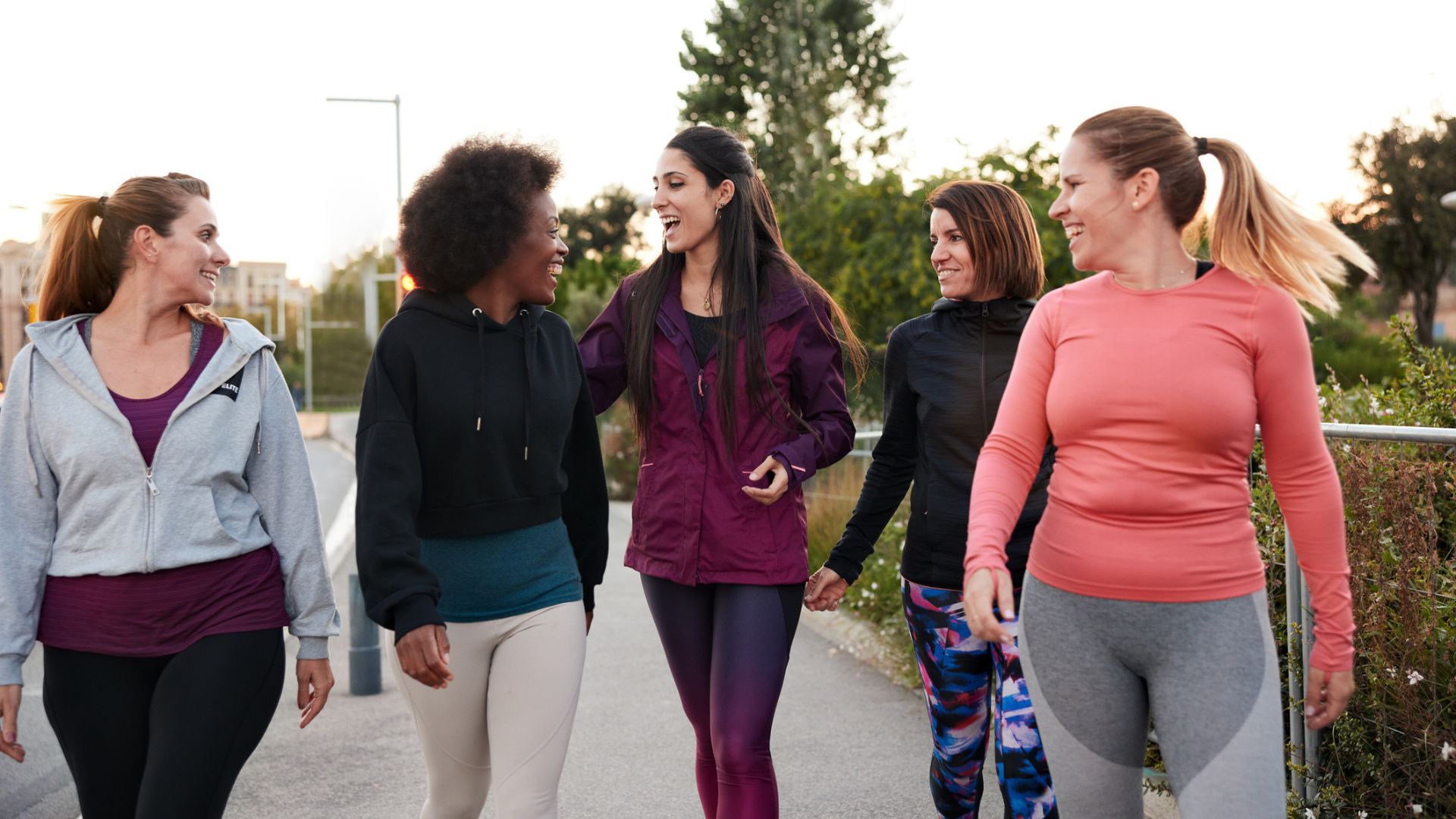
13. A chance to socialize
The number of friends we have decreases as we get older, with 13% of women in their late 40s reporting that they've lost contact with most close friends over the years, a survey from the Survey Center on American Life shows. While this won't be the case for everyone, if you want to get out and meet new people, running is one of the best activities for this.
And naturally, a better social connection comes with a whole host of health benefits by itself. "The strength of your social connections has a direct impact on your mental health and stress. Running clubs and training groups can be found in nearly every city and these types of groups offer plenty of opportunities to make meaningful connections, form a sense of belonging, and feel part of a larger community," says Anzures.
There's even research to back up the benefits. A study of over 300,000 participants by Brigham Young University produced results that largely indicated stronger social relationships could reduce the risk of mortality by up to 50%, a finding that was consistent across gender, age, and location, and remained the same on follow-up. A further study by the University of Georgia goes so far as to suggest that women feel the reward of mental social connection more than men.
"While running alone can have some real benefits to the brain and mental health, running with others can do the same," says Hislop. "When in a group people tend to share and allow a group to help solve a problem. Too often we steer away from groups because we're concerned we're not fast enough but you’ll never know until you try."
Plus, she adds, running with others can help you improve. "It's great to do some runs too hard as it's a chance to boost your VO2. Hang on and let other people talk you through the run. If someone's telling a good story or saying something interesting, you’ll likely work to keep up. The opposite is good too. Run easy, be able to sing a song, and tell an entire story without getting winded [is great for recovery days]. We need both ends of the spectrum," she says.
How many times a week should a woman run?
There's no one-size-fits-all approach to this question as it depends on the individual but triathlon and IronMan coach Kinney suggests "beginner runners start with shorter sessions of 20 to 25 Minutes, three to four times per week, allowing a day off from running in between."
As part of this, those looking to learn how to start running should mix running and walking. "There is no one correct ratio, but erring on the side of less is more is a good place to start. The reason for progressing conservatively is the body must adapt to the demands of the new sport. Running imparts large loads on the joints, ligaments, tendons, and muscles. It takes time for the soft tissue to strengthen and become more resilient."
While it might be tempting to run every day, especially if you're seeing progress, Kinney warns that this could set you back. "Running too much, too often, too fast as a beginner generally results in some type of use injury that derails their progress before it really begins. Be patient and be disciplined about building volume and pace slowly with a blend of a run to walk that aligns with the current level of fitness."
And where possible, incorporate some strength training into your routine, urges Hislop. "While running can help you get stronger, you really do need to add in weight-bearing exercise to build or maintain muscle at a minimum. After the age of 30, we lose muscle mass (up to 8% a decade) and bone density. Women can lose up to 20% of their bone density in the first five to seven years post-menopause."
Contrary to popular belief, she says, weightlifting will not build big muscles, it will just create a more resilient body. And if you are going through perimenopause, "the typical HIIT workouts aren't great. We need recovery and those short bursts of work and rest aren't enough of either."
How long does it take to see results from running?
Women who start running for the first time and stay consistent can expect to see rapid changes in the first four weeks, says Kinney. The body adapts to the strain that it's under during this time, he explains. "When we run, the body is put into a state where the muscles are stressed and damaged. Once the run has been completed, the body shifts into a state where the rest, recovery, and quality sleep that follow allow the repair processes to take place. This is where the fitness gains are generated."
New runners that are starting out after a few years doing other endurance sports like running or cycling will still see these changes, he says, but they won't be the same big improvements that those totally new to running will see.

Grace Walsh is woman&home's Health Channel Editor, working across the areas of fitness, nutrition, sleep, mental health, relationships, and sex. She is also a qualified fitness instructor. In 2025, she will be taking on her third marathon in Brighton, completing her first ultra marathon, and qualifying as a certified personal trainer and nutrition coach.
A digital journalist with over seven years experience as a writer and editor for UK publications, Grace has covered (almost) everything in the world of health and wellbeing with bylines in Cosmopolitan, Red, The i Paper, GoodtoKnow, and more.
-
 Unforgettable date ideas to make a great first impression or rekindle romance
Unforgettable date ideas to make a great first impression or rekindle romanceForget the same old first date formula - these unforgettable date ideas will leave them thinking about you long after you go home
By Natalie Denton Published
-
 Butter yellow might be the colour of the season, but Amal Clooney is making me want to try sunshine shades
Butter yellow might be the colour of the season, but Amal Clooney is making me want to try sunshine shadesSpark some joy by adding some statement yellow pieces to your wardrobe just in time for summer
By Matilda Stanley Published